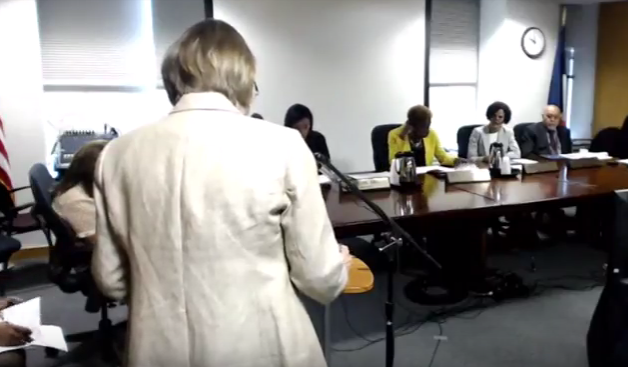
NYCHA video
Anne-Marie Flatley, NYCHA's Vice President of the Performance Management and Analytics Division, tells the board about the notice being sent to HUD concerning lead-inspections lapses.
NYCHA’s five member board was confronted with a typical agenda when it gathered for its monthly meeting last July 26. It approved the minutes from its previous meeting in June. It heard a report from one its members, the NYCHA chairwoman Shola Olatoye, about efforts to get more flexible hours for maintenance work, reduce rodent infestation and begin construction at some of the new development sites under her NextGen NYCHA plan. Next, the general manager of the housing authority unveiled metrics on how fast NYCHA was repairing apartments and noted that the agency had been rated a “high performer” for its running of the Section 8 voucher program.
Then a succession of NYCHA officials addressed the board to propose contracting decisions, like amending an IT contract, rejecting bids for bond paper, awarding deals for heating fuel and floor tiles, and approving a new insurance policy.
Ninety minutes into the meeting, Anne-Marie Flatley, NYCHA’s Vice President of the Performance Management and Analytics Division, came to the mic to talk about item 37—a “significant amendment” to the 2017 annual plan the authority had submitted to the federal government.
Discussion of the lead-paint certification revision begins at 1:30:00
* * * *
Flatley described a long list of changes to the plan that NYCHA wanted to tell the Department of Housing and Urban Development about: the new PACT program taking hold in the Bronx and Brooklyn, the disposition of land for affordable housing development, the demolition of vacant commercial space at the Ocean Bay/Oceanside development, the authority’s new smoke free housing policy and the new capital and five-year action plan.
At the end of the list was a new certification to HUD. “The signed certification includes a notation which has been discussed with HUD about NYCHA’s cooperation with the U.S. Attorney’s office for the Southern District of New York’s investigation into public housing conditions which was initiated in October of 2015,” Flatley said.
According to Olatoye’s testimony at Tuesday’s City Council hearing on the lead scandal, this was the first public acknowledgement of the lapse in city inspections.
Councilmembers at the hearing were sharply critical of Olatoye for not being more explicit about what had happened when it communicated with tenants about the need to get access to their apartments for new inspections. They were also upset that Olatoye hadn’t informed the general public—or the Council itself, which had asked about lead inspections at a March 2016 hearing—about the problems prior to the release of the Department of Investigations report last month.
While Olatoye accepted much of that criticism, she denied any effort to cover up the lapses, and noted that she had disclosed them at the public board meeting this summer.
The video of that meeting, however, indicates the revelations lacked detail, in part because board members didn’t ask for very much.
“The revision asserts that NYCHA is working to ensure full compliance with lead-based paint regulations but at the time of the certification is not in full compliance,” Flatley continued. “The signed certification along with the amendment and board resolution, will be hand-delivered to HUD’s field office by next week.”
NYCHA board member Nnenna Lynch asked for more information. Olatoye said she couldn’t “go into specifics” because of the ongoing federal investigation but that “Our continuing cooperation with the Southern District has led us to review our compliance function as it relates to lead based paint.”
“Our conclusion is that we have not been complaint with certain aspects of the lead regulations and that is just simply unacceptable and so what we have done not only as part of NextGen is demand a fundamental shift in the way that we do business and that includes the way we address our lead issues,” the chairwoman continued. “One child exposed is one child too many,” she added. She noted the low levels of lead poisoning in New York but noted, “NYCHA has to be better and must do better.”
Olatoye said the agency’s focus would be on four problematic areas: risk assessment, inspections, visual assessment of hazards and re-evaluations. The work would be “expensive and important,” she said. “We are taking meaningful steps in concert with our colleagues at HUD … to move us toward full compliance.”
Those steps included, she said, a contract the board had approved the previous month for carrying out inspections. Olatoye did not attend that meeting. The contract in question was the sixth item on a 28-item procurement list for the board to vote on. Luis Ponce, a senior vice president for operations, told the board the contract represented the first time the authority would use an outside vendor for lead inspections, and that the work would focus on 87 developments and 135 homes under NYCHA control where it’s required that there be annual inspections to check that lead paint doesn’t pose a hazard to kids. The board asked not one question about the contract. Ponce has since been suspended and demoted for his role in the lead debacle.
Discussion of the lead-paint inspection contract begins at 21:00
* * * *
In the July meeting, Olatoye said the move to new inspections was “a pretty significant, radical way of getting of moving to full compliance.”
“It sounds like we have our arms around what it will take to get full compliance,” Lynch said, apparently looking for confirmation of that idea.
Olatoye reacted: “There’s still a lot of work to be done. This is going to be a long and tens if not hundreds of millions of dollars of work to be done. We are making important strides to move toward full compliance. And we’ll have more to say pending this investigation.”
There were no further questions.








